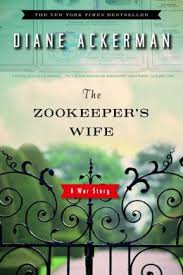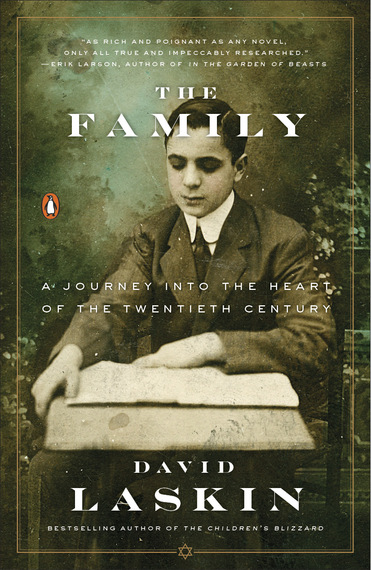My son Jeremy is reading Diane Ackerman's The Zookeeper's Wife during his senior year of high school. I am reading the book alongside him, giving him a crash course in how to take good notes. (You guessed it: I am a college professor who loves questions, except for a few, like, "Will this be on the exam?" and "Is it okay if I just write notes in the margins?") The Zookeeper's Wife is about a zoo in Poland that became a place of safety, with hidden tunnels, contraband animals, and dozens of refugees during the Nazi era.
(You guessed it: I am a college professor who loves questions, except for a few, like, "Will this be on the exam?" and "Is it okay if I just write notes in the margins?") The Zookeeper's Wife is about a zoo in Poland that became a place of safety, with hidden tunnels, contraband animals, and dozens of refugees during the Nazi era.
Recently I read another book by award-winning author David Laskin. The Family tells the true story of how Laskin's family of Torah scribes and humble shopkeepers split into three branches at the turn of the last century. One branch of Laskin's family came to the U.S. and founded the fabulous Maidenform Bra Company. This branch embodied the American dream. Another branch immigrated to Palestine in the 1920s. Wildly idealistic pioneers, cousins Chaim and Sonia fell in love on the parched hillsides of the Galilee. The third branch stayed put in Poland. Mothers, teachers, big-eared and knobby-kneed children remained behind in Europe and perished -- all of them -- in the Holocaust.
One branch of Laskin's family came to the U.S. and founded the fabulous Maidenform Bra Company. This branch embodied the American dream. Another branch immigrated to Palestine in the 1920s. Wildly idealistic pioneers, cousins Chaim and Sonia fell in love on the parched hillsides of the Galilee. The third branch stayed put in Poland. Mothers, teachers, big-eared and knobby-kneed children remained behind in Europe and perished -- all of them -- in the Holocaust.
Both books are must-reads in light of Holocaust Remembrance Day (Yom HaShoah), which extends from Sunday evening until Monday evening, April 27-28. What these books do so well is introduce us to otherwise unnamed people who endured the Holocaust. The Family, which begins near Vilnius, Lithuania, exposes the quotidian lives of Jews caught between the power play of Russia and Germany. Riveting descriptions of people simply keeping life afloat during the Soviet and Nazi occupations are staggering in their simplicity; Laskin's choice of details is uncanny. With a facial expression or snippet from a letter, he captures the mood of a whole village, maybe even an entire nation.
The Zookeeper's Wife, centered in Warsaw, Poland, features heroic individuals who risked -- and forfeited -- their lives to rescue others. Ackerman takes us to the heart of darkness, but always with specks of light, like the Fox Man, a Polish fur grower who supplied fur to the Germans for soldiers on the Russian front. "Eccentric" hardly describes the Fox Man. When he came to live in the zoo, he could be found asleep on the floor, "as if fatigue simply overtook him and he hadn't the energy to lurch a step farther" (191). Then, one night, at 1 a.m., he started to play the piano. He played through the night. Turns out he had been a professional pianist.
Rachmaninoff at midnight. A speck of light in the heart of darkness.
I'm only at page 201 (my son is catching up -- the notes are slowing him down), but another of the characters in The Zookeeper's Wife has captured my imagination: Janusz Korczak, a Warsaw pediatrician and author of children's books who founded an orphanage in 1911. When the Nazis established the Warsaw Ghetto, the orphanage's ranks swelled to 200 children.
In July, 1942, the Nazis ordered all inhabitants of the ghetto to be resettled in the East. On August 5, the children were transported to the Treblinka extermination camp in windowless box cars. According to the University of Minnesota Center for Holocaust and Genocide Studies, an eyewitness from the ghetto saw the extraordinary drama and survived to describe it:
At the head of a thin line was Korczak! No, how could it be? The scene I shall never forget. In contrast to the mass of humanity being driven like animals to slaughter, there appeared a group of children marching together in formation. They were the orphanage children walking four abreast in a line behind Korczak. His eyes were lifted to heaven. Even the military personnel stood still and saluted. When the Germans saw Korczak, they asked, 'Who is that man?'
That man was Janusz Korczak. I can't even pronounce his name. But I know this: I can pray it. And I can pray, as well, for a microscopic share of his courage.
